Do you live in the US, UK or Canada? Are you looking for a low-cost business opportunity that can generate passive income? Consider launching a vending machine business.
Read on to learn practical insights and guides on how to get started.
What Are Vending Machines?
Vending machine are automated kiosks that dispenses products to a customer after they insert money, swipe a card, or uses a digital payment method. (You can think of them as the ATMs of consumer goods.) They come in different types and sizes and hold and display snacks, beverages, coffee, hot chocolate, soups, ice cream, meat, pharmacy items, etc. Others hold pharmaceutical products, vegetables, engagement rings, phone accessories, etc.
Typically, they are often found in ‘high foot traffic’ areas like airports, malls and large venue events. They are also found in gyms, schools, hotels, lobbies, lounges and waiting, office buildings, hospitals, etc.
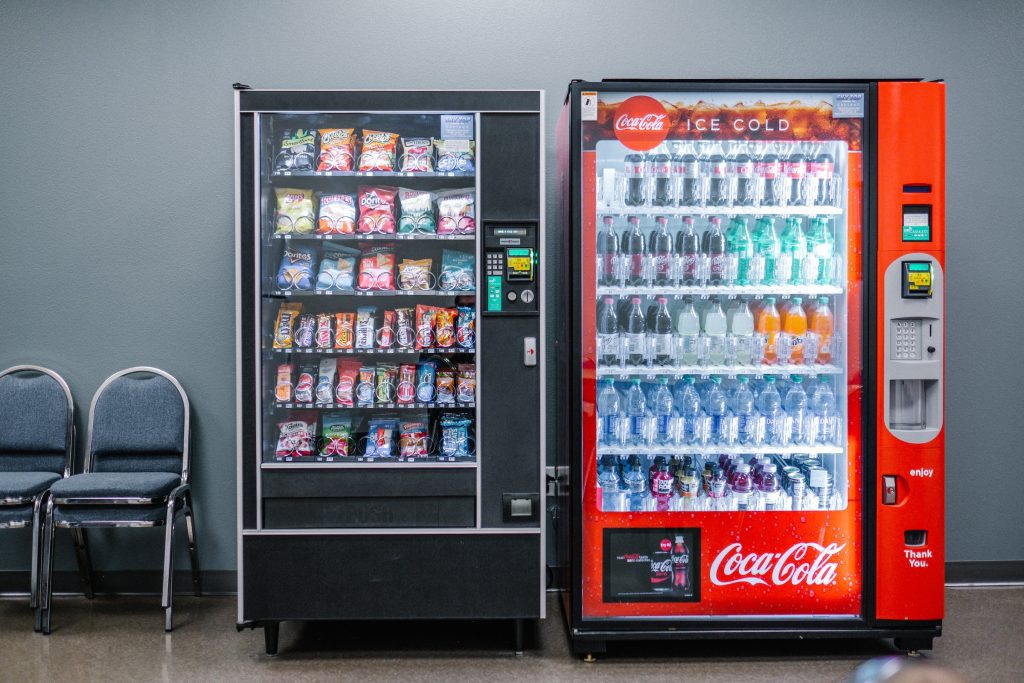
How Do Vending Machines Work?
A customer selects the item they wish to purchase and pays the given amount. The machine then automatically releases the item. It does this in one of two ways. Either it releases the product into a compartment at the bottom (or a cup in the case of drinks) that the customer reaches into. Or it unlocks a door or drawer that the buyer can access.
Vending machines accept cash, credit/debit cards, mobile payments, and contactless payment options. They often have touchscreens and others interactive displays through which customers select products and make payments. They also allow operators to monitor and track sales in real-time and remotely.
Many vending machines incorporate energy-saving features to reduce operational costs due to electricity. Some operators integrate e-commerce platforms that enable customers to browse, order, and pay for products remotely.
How Big Is the Vending Machine Industry?
Global Industry Analysts estimate the global market value of vending machines at US$21.3 Billion for the year 2020 and US$25.7 Billion for 2022. They predict the market would grow up to US$30.8 Billion by 2030. In its own report, Grand View Research gives an even bolder estimate of US$51.9 Billion in 2021 and a compound annual growth rate of 10.7% through 2030.
Allied Market Research estimates the value of the vending machine market to reach up to $37.2 billion by 2032. In light of these two estimates, it is clear that the vending machine market is indeed large and growing. Obviously, this is due to changing retail preferences, and the need for on-the-go services for a busy modern lifestyle.
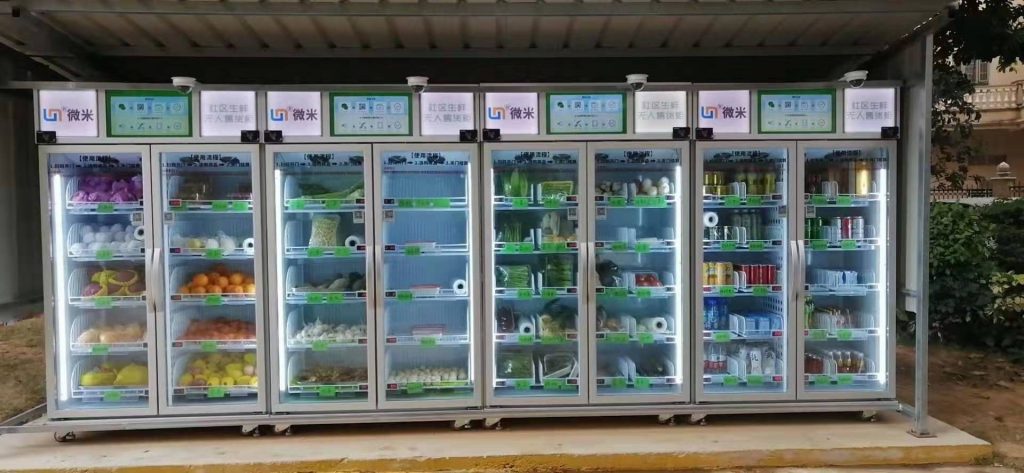
The US Vending Machine Market
The US market is of special interest because it accounts for a third (30.7%) of the global market. Global Industry Analytics estimates the vending machines market in the U.S. to stand at US$8.5 Billion in the year 2022. About 2 million vending machines are in operation in the United States with a revenue of US$7.4 billion for its operators.
In the US, a 100 million people use vending machines every single day, that’s nearly 1 out of every 4 persons. With 2 million operational machines, a typical machine sees at least 5 customers every day. It also means that the average American adult spends approximately US$35 per year on vending machine items.
Specifically, these 2 million machines are owned and operated by 17.6k small businesses with less than 1 million dollars in annual revenue. Florida, Texas and California are the states where the majority of these machines are installed.
The Nigerian Vending Machine Market
The vending machine market in Nigeria is growing. According to market analysts, 6W research, the Nigerian vending machine market’s boom started in 2020 and is expected to continue till 2026. They tie their prediction to several key factors. These include a surge in demand for ready-to-eat foods, and investments pouring into the food and beverage sector.
Furthermore, they cite the growth of Nigeria’s tourism sector, the increasing number of supermarkets, specialty food stores, and hypermarkets. Additionally, they highlight Nigeria’s growing organized retail sector, changing lifestyle of consumers, evolving technology, as well as rapid urbanization. Another key factor they highlight is the desire of major vending machine manufacturers to expand their footprint in Nigeria.
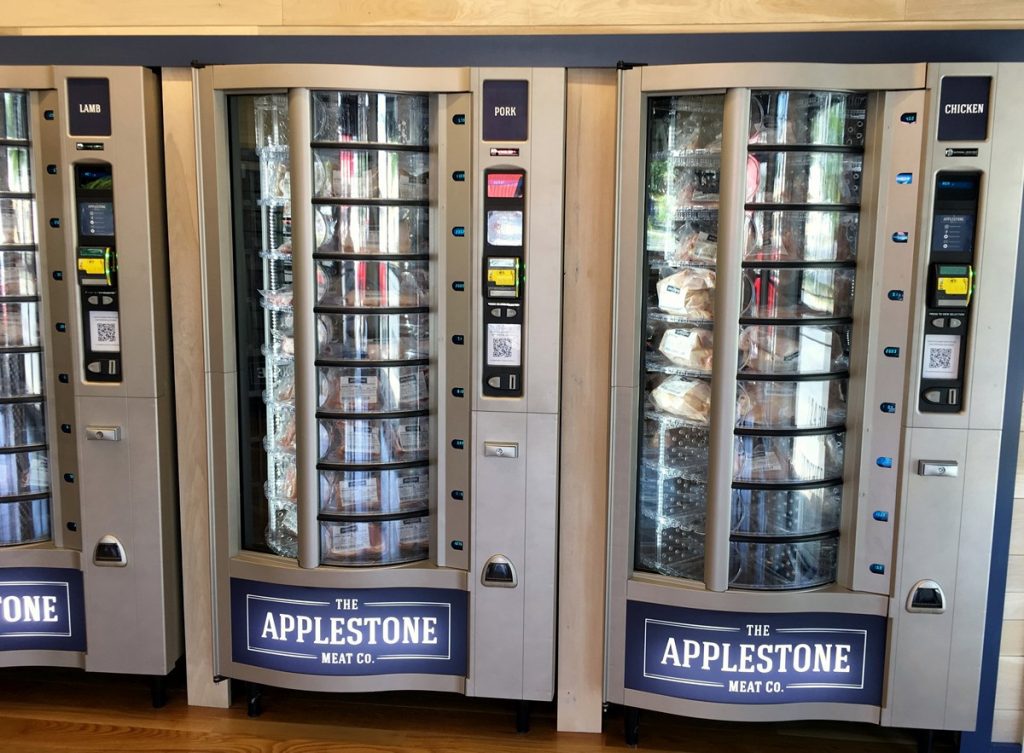
Pros
Startup and Overhead Costs Are Low: Unlike traditional businesses, vending machine companies don’t require huge upfront investment or large operational overhead. They also do not require any specialized skills that might require you to pay to acquire them. Your primary expense will be buying the machines themselves and your first inventory.
It Allows You A More Flexible Lifestyle: As a vending machine operator, you won’t need to meet specific work hours. You can check on the machines, restock, and perform maintenance according to your own schedule.
It’s a Sure Bet On Passive Income: Vending machines can generate income on their own without your constant supervision. This will allow you to earn passive income and have more free time. Even so, the maintenance can even be outsourced though it will eat into your profits.
The Business is Highly Scalable: Once your machines become profitable, you can easily scale up by adding more machines and expanding into new locations at a pace that suits you.
Cons
The Competition Is Getting Harder To Crush: The increasing popularity of vending machine businesses means that securing prime locations with high foot traffic can be challenging. This is especially the case in areas like hospitals, hotels, and airports.
Maintenance Fees Can Eat Into Your Profits: Ensuring that your machines remain in good working order is very important. In the case of repairs, paying for them can eat into your profits. Additionally, machines can be vandalized or even stolen if they are installed in location without full-time surveillance.
Managing your Inventory Can Be Time-Consuming: Keeping your machines well-stocked with a variety of options is key. This is necessary to reduce customer complaints. Staying on top of your inventory and knowing when to restock or order replacement products can be time-consuming. Regardless, this can be outsourced though doing so will eat into your profits.

Steps to Start a Vending Machine Business
Decide on Your Business Structure: Most vending machine operators in the US opt for an LLC (Limited Liability Company) or a sole proprietorship. LLCs offer them personal liability protection and lots of potential tax benefits.
Choose Your Products: Research the market to gain insights into the demands in your target locations. Although snacks and drinks are the commonest products of vending machines, you can consider bulk vending, specialty items, or even electronic accessories.
Location, Location, Location!: Scout high-traffic areas with little competition, such as office buildings, schools, malls and shopping centers. Afterwards, obtain permission from the property owners and sign a contract that allows you to use their space in exchange for a down payment or commission from net earnings.
Obtain Necessary Permits: Research and obtain licenses and permits from federal, state, and local authorities to operate your vending machine business legally.
Stock Up: Purchase supplies from wholesale distributors, manufacturers, retailers, or convenience stores. Compare prices and negotiate the best deals to maximize your profits.
Track Sales and Adjust Your Inventory: Monitor the performance of your machines by recording and analyzing sales data. This will help you identify products that need to be restocked more frequently or replaced with more popular options.
Routinely Maintain and Constantly Restock Your Machines: Despite being low-maintenance, vending machines still require routine servicing and restocking to keep them operational. Otherwise, you will not only lose customers but also profits due to out-of-stock or expired products.
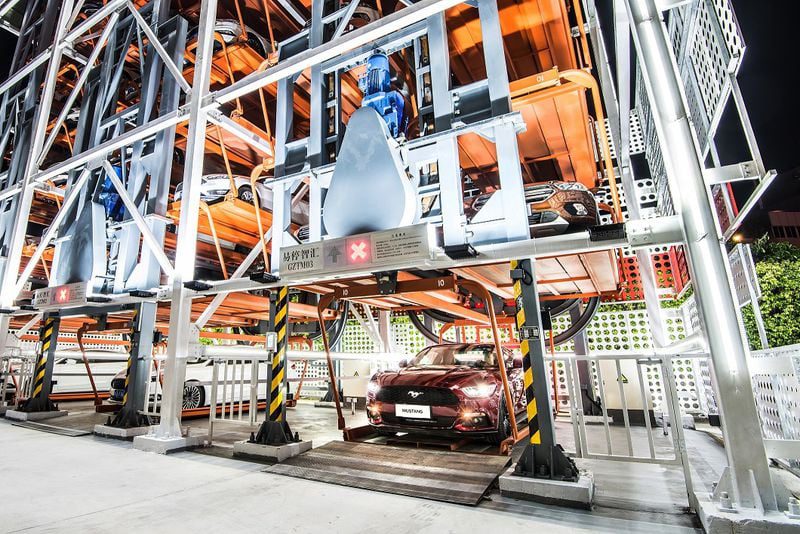
How Profitable Is the Vending Machine Business?
Expectedly, the profitability of vending machines depends on factors like location, product offerings, and the number of machines you operate. According to USAToday, standard vending machines typically bring in more than $75 per week. This means average earnings of between $300 to $1,500 per month for the operators.
Nonetheless, machines installed in high-traffic areas with well-maintained inventory can generate even higher profits. TheHustle.co gives a breakdown of operating costs reported in its survey of 23 vending machine owners in the US:
- General liability insurance (~$500/yr for <$100k in annual sales)
- Commissions paid to locations (5-25% of revenue)
- Transaction fees for card purchases (~5-6%)
- Card reader analytics fees ($10/mo)
- Storage space for unused machines (~$100/mo)
- Gas and transportation ($50-$100/mo)
- Taxes (10-37% of adjusted gross income)
- Routine maintenance and vandalism repairs ($50-$250/yr)
- Logistics due to their bulk
Consequently, they estimate that an operator who makes $5,000 per month in revenue might take home something like $2,000 in profit, that is 40% of the gross. There are few businesses that promise such returns.
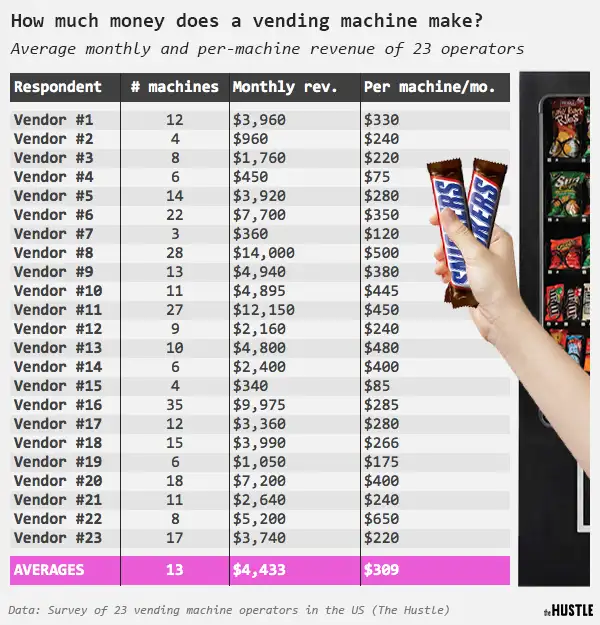
Getting Started
Startup costs for a vending machine business can vary. Accordingly, it mostly depends whether you lease or purchase the machines, the number of machines you choose to buy, and their features. Secondhand machines are an option. Whereas new machines can cost several thousand dollars (between $3,000 to $8,000), secondhand ones can cost a few hundred dollars ($300).
TikTok account, Vending University and owners of 15 vending machines, gives a more concise breakdown of start up costs:
- Moving and installation expenses: $250
- Cash and coins: between $100 and $300
- Purchase of vending machine: Between $1,000 and $2,500
- Inventory: About $50
- Business registration
- Marketing materials, including a website: Between $50 and $100.
- Total: Between $1,500 and $3,000
Other additional expenses to consider include:
- Licensing and permits
- Insurance
- Location fees/commission
In summary, a vending machine business can be a lucrative as well as a flexible side hustle. With these insights, you can increase your chances of success and enjoy the benefits of passive income and scalability that the business offers.
Don’t Miss:
The Top 10 High-Paying Job List- The Future of Work: Looking for a career with long-term potential and great pay? Check out our top 10 high-paying job in demand list!
5 Passive Income Ideas to Cover Your Rent in 2024: Fed up with living paycheck to paycheck? Discover 5 passive income ideas to boost your income effortlessly, and see out the remainder of 2024 with extra cash!
Read SimplVest Exclusives, our collection of exclusive interviews with entrepreneurs disrupting their spaces and get inspired by their stories.












